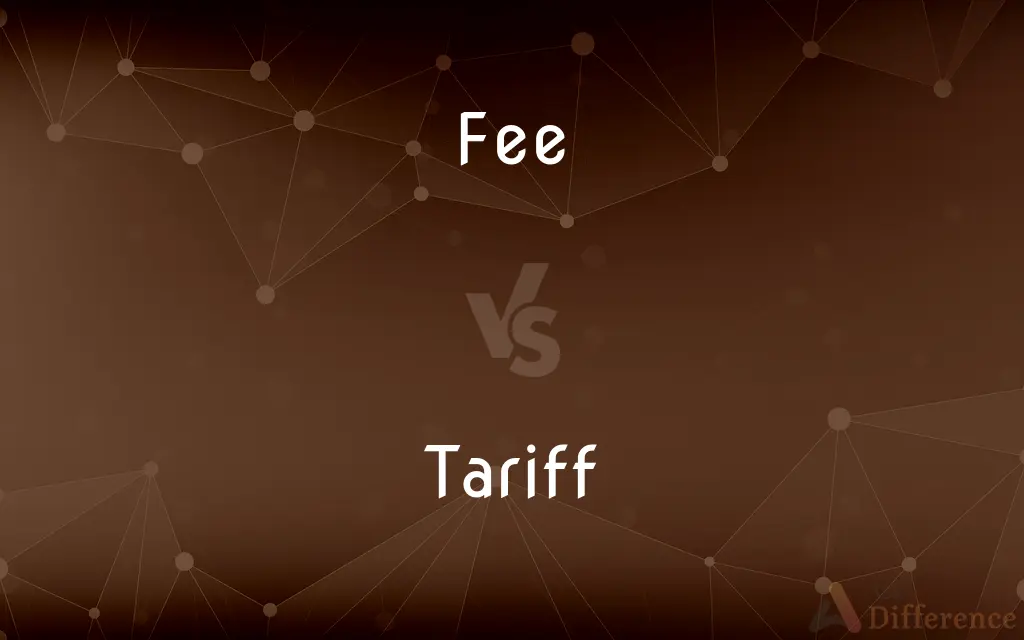Fee vs. Tariff — What's the Difference?
Edited by Tayyaba Rehman — By Fiza Rafique — Updated on April 3, 2024
A fee is a payment made for a service or privilege, often specific to professional services or transactions, while a tariff is a tax on imports or exports between sovereign states.

Difference Between Fee and Tariff
Table of Contents
ADVERTISEMENT
Key Differences
Fees are charges for specific services or privileges, such as admission fees for parks, legal fees for attorney services, or transaction fees in banking. They are direct payments made by individuals or businesses to entities (public or private) for the provision of a service, access to facilities, or participation in certain activities. On the other hand, tariffs are taxes imposed by a government on goods as they enter or leave a country, primarily used to regulate trade, protect domestic industries, or generate revenue. Tariffs are applied to the price of imported or exported goods, affecting their market price and ultimately being passed on to consumers in the form of higher costs.
While fees are generally fixed amounts or calculated based on the service's cost or the transaction's value, tariffs can vary widely depending on the product, the country of origin, and the specific trade policies in place. Fees are usually transparent to the payer and directly related to specific services or transactions, whereas the impact of tariffs on product prices can be less direct, influencing market dynamics and consumer prices over time.
Another key difference lies in their purpose and effect: fees are often designed to cover the cost of providing a service, maintain facilities, or regulate certain activities, with a relatively localized impact. Tariffs, however, are used as economic policy tools, influencing international trade patterns, supporting domestic industries, and retaliating in trade disputes, with broader economic implications.
The collection and administration of fees and tariffs also differ significantly. Fees are collected by the service provider, whether a government entity, a professional, or a business. In contrast, tariffs are collected by customs authorities at points of entry or exit and require complex classification and valuation processes to determine the correct amount due.
While both fees and tariffs represent charges for specific purposes, their nature, application, and impacts vary significantly, reflecting their roles in economic transactions and international trade respectively.
ADVERTISEMENT
Comparison Chart
Definition
Charge for a service, privilege, or transaction
Tax on imports or exports
Purpose
Cover costs of services, access, or regulation
Regulate trade, protect industries, generate revenue
Applied To
Services, transactions, privileges
Imported or exported goods
Collected By
Service providers, government agencies
Customs authorities
Impact
Directly relates to specific services
Influences market prices and trade patterns
Variability
Fixed or based on service/transaction value
Varies by product, country, trade policy
Economic Role
Localized, service-oriented
Broad, policy-oriented
Compare with Definitions
Fee
Payment for professional services.
The lawyer charged a consultation fee for the meeting.
Tariff
Duty on exports.
Some countries apply tariffs on raw materials to encourage domestic processing.
Fee
Cost associated with a transaction.
Online ticket purchases often include a booking fee.
Tariff
Tax on imported goods.
The government imposed a tariff on luxury cars to protect the domestic auto industry.
Fee
Contribution for participation.
The conference required a registration fee from all attendees.
Tariff
Trade policy tool.
Tariffs were raised on certain goods as part of a trade dispute retaliation.
Fee
Charge for accessing facilities.
The national park's entrance fee supports its maintenance and conservation.
Tariff
Protection for local industries.
Agricultural tariffs help safeguard farmers from international competition.
Fee
Regulatory charge.
Businesses may pay a licensing fee to operate in certain areas.
Tariff
Revenue source for governments.
Tariffs on electronics contribute significantly to the national treasury.
Fee
A fee is the price one pays as remuneration for rights or services. Fees usually allow for overhead, wages, costs, and markup.
Tariff
A tariff is a tax imposed by a government of a country or of a supranational union on imports or exports of goods. Besides being a source of revenue for the government, import duties can also be a form of regulation of foreign trade and policy that taxes foreign products to encourage or safeguard domestic industry.
Fee
A fixed sum charged, as by an institution or by law, for a privilege
A license fee.
Tuition fees.
Tariff
A list or system of duties imposed by a government on imported or exported goods.
Fee
A charge for professional services
A surgeon's fee.
Tariff
A duty or duties so imposed.
Fee
A tip; a gratuity.
Tariff
A schedule of prices or fees.
Fee
(Law) See fee simple.
Tariff
To fix a duty or price on.
Fee
In feudal law, an estate in land granted by a lord to his vassal on condition of homage and service. Also called feud2, fief.
Tariff
A system of government-imposed duties levied on imported or exported goods; a list of such duties, or the duties themselves.
Fee
The land so held.
Tariff
A schedule of rates, fees or prices.
Fee
To give a tip to.
Tariff
(British) A sentence determined according to a scale of standard penalties for certain categories of crime.
Fee
(Scots) To hire.
Tariff
(transitive) to levy a duty on (something)
Fee
(feudal law) A right to the use of a superior's land, as a stipend for services to be performed; also, the land so held; a fief.
Tariff
A schedule, system, or scheme of duties imposed by the government of a country upon goods imported or exported; as, a revenue tariff; a protective tariff; Clay's compromise tariff. (U. S. 1833).
Fee
(legal) An inheritable estate in land held of a feudal lord on condition of the performing of certain services.
Tariff
The duty, or rate of duty, so imposed; as, the tariff on wool; a tariff of two cents a pound.
Fee
(legal) An estate of inheritance in land, either absolute and without limitation to any particular class of heirs (fee simple) or limited to a particular class of heirs (fee tail).
Tariff
Any schedule or system of rates, changes, etc.; as, a tariff of fees, or of railroad fares.
Fee
(obsolete) Property; owndom; estate.
Tariff
To make a list of duties on, as goods.
Fee
(obsolete) Money paid or bestowed; payment; emolument.
Tariff
A government tax on imports or exports;
They signed a treaty to lower duties on trade between their countries
Fee
(obsolete) A prize or reward. Only used in the set phrase "A finder's fee" in Modern English.
Tariff
Charge a tariff;
Tariff imported goods
Fee
An additional monetary payment charged for a service or good that is minor compared to the underlying cost.
Fee
To reward for services performed, or to be performed; to recompense; to hire or keep in hire; hence, to bribe.
Fee
Property; possession; tenure.
Once did she hold the gorgeous East in fee.
Fee
Reward or compensation for services rendered or to be rendered; especially, payment for professional services, of optional amount, or fixed by custom or laws; charge; pay; perquisite; as, the fees of lawyers and physicians; the fees of office; clerk's fees; sheriff's fees; marriage fees, etc.
To plead for love deserves more fee than hate.
Fee
A right to the use of a superior's land, as a stipend for services to be performed; also, the land so held; a fief.
Fee
An estate of inheritance supposed to be held either mediately or immediately from the sovereign, and absolutely vested in the owner.
Fee
An estate of inheritance belonging to the owner, and transmissible to his heirs, absolutely and simply, without condition attached to the tenure.
Buy the fee simple of my life for an hour and a quarter.
Fee
To reward for services performed, or to be performed; to recompense; to hire or keep in hire; hence, to bribe.
The patient . . . fees the doctor.
There's not a one of them but in his houseI keep a servant feed.
Fee
A fixed charge for a privilege or for professional services
Fee
An interest in land capable of being inherited
Fee
Give a tip or gratuity to in return for a service, beyond the agreed-on compensation;
Remember to tip the waiter
Fee the steward
Common Curiosities
Can fees be negotiated?
Some fees, especially for professional services, can be negotiated based on the service level or volume of transactions.
Do tariffs affect all imported goods?
Not all imported goods are subject to tariffs; it depends on the trade agreements and policies of the importing country.
What happens to the money collected from fees and tariffs?
Money from fees usually covers the costs of the provided services, while tariff revenues go to the government's general budget.
Who pays tariffs?
Importers pay tariffs when they bring goods into a country, but the costs often trickle down to consumers as higher prices.
How are fees determined?
Fees are typically set by the service provider based on the cost of the service, market rates, or regulatory guidelines.
Can tariffs change frequently?
Tariffs can change due to shifts in government policy, trade negotiations, or retaliatory measures in trade disputes.
Do tariffs apply to services?
Tariffs primarily apply to goods, not services; trade in services may be regulated by other means, such as quotas or licensing requirements.
What's the difference between a fee and a fine?
A fee is a charge for a service or privilege, whereas a fine is a penalty imposed for violating rules or laws.
Are tariffs used in all countries?
Most countries use tariffs as part of their trade and economic policies, though the rates and affected goods vary widely.
How are tariffs set?
Tariffs are set by governments, based on economic policy goals, trade agreements, and sometimes in response to international trade dynamics or to protect domestic industries.
What role do international organizations play in regulating tariffs?
Organizations like the World Trade Organization (WTO) work to regulate tariffs and ensure that trade flows as smoothly, predictably, and freely as possible among member countries.
Is there a way to avoid paying fees?
While some fees are mandatory, others, like late payment or convenience fees, can be avoided by timely payment or choosing alternative transaction methods.
Can tariffs lead to trade wars?
Yes, when countries retaliate against each other's tariffs, it can escalate into a trade war, affecting global trade and economic relations.
Why do some services have hidden fees?
Hidden fees may be used to make a service appear cheaper at first glance, a practice that is criticized for lack of transparency.
How do fees impact the affordability of services?
High fees can make services less accessible to certain populations, raising concerns about equity and access.
Are there ethical concerns with tariffs?
Ethical concerns can arise if tariffs disproportionately affect lower-income populations or if they are used as a tool for political leverage rather than economic policy.
Share Your Discovery

Previous Comparison
Lager vs. Draught
Next Comparison
Sulk vs. PoutAuthor Spotlight
Written by
Fiza RafiqueFiza Rafique is a skilled content writer at AskDifference.com, where she meticulously refines and enhances written pieces. Drawing from her vast editorial expertise, Fiza ensures clarity, accuracy, and precision in every article. Passionate about language, she continually seeks to elevate the quality of content for readers worldwide.
Edited by
Tayyaba RehmanTayyaba Rehman is a distinguished writer, currently serving as a primary contributor to askdifference.com. As a researcher in semantics and etymology, Tayyaba's passion for the complexity of languages and their distinctions has found a perfect home on the platform. Tayyaba delves into the intricacies of language, distinguishing between commonly confused words and phrases, thereby providing clarity for readers worldwide.














































